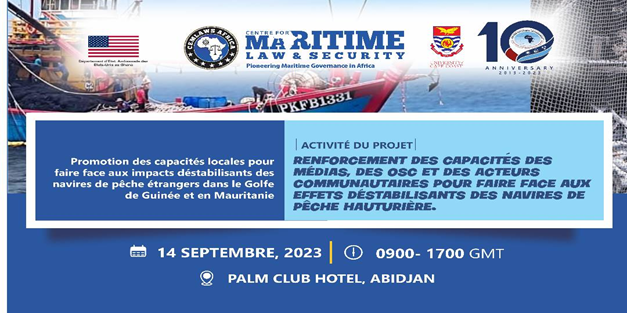Abidjan, Côte d’Ivoire, September 14, 2023 – In an effort to address the destabilizing impacts of foreign-owned Distant Water Fishing Vessels (DWFVs) in the Gulf of Guinea, a capacity-building and training workshop was held today in Abidjan, Côte d’Ivoire. This crucial initiative, part of the ongoing project titled “Promoting Local Capacity to Address the Destabilizing Impacts of Foreign Fishing Vessels in the Gulf of Guinea and Mauritania,” aimed to equip participants, including reporters, journalists, civil society organizations (CSOs), and community actors, with the skills necessary to monitor and report the negative effects of DWFVs on the Ivorian fishing industry.
Overview of the DWFV Issue
Foreign-owned DWFVs, often operating under flags of convenience, have long been a concern for African countries, with approximately 97.2% of these vessels operating in the Gulf of Guinea.
Their activities include unsustainable exploitation, illegal, unreported, and unregulated (IUU) fishing, and the depletion of fish stocks, causing immense economic and environmental damage. The West African region alone loses an estimated 790,000 tons of fish annually, resulting in over $2 billion in economic losses.
Côte d’Ivoire, with its heavy reliance on fisheries and a coastline spanning 590 kilometers, is particularly vulnerable to IUU fishing due to inadequate monitoring and control of fishing activities. This workshop sought to address these issues by building the capacity of media, CSOs, and community actors in the region.
Expected Outcomes
The training workshop aimed to achieve several critical outcomes, including building the capacity of participants in effectively monitoring and reporting the destructive activities of DWFVs. It also aimed to provide a comprehensive understanding of fisheries laws, management policies, and other relevant fisheries issues to enhance transparency and accountability in DWFV fishing activities within Côte d’Ivoire.
Collaborating Partners and Participants
The project was implemented through a collaboration between the DWFV Project Working Team (CEMLAWS Africa and CCM, UCC) and the Centre de Recherches Océanologiques (CRO). CRO, known for its expertise in ocean research, played a crucial role in mobilizing participants and preparations for the training workshop.
The workshop welcomed a diverse group of 25 participants, including 12 journalists, 7 representatives from fisheries CSOs, and 6 community actors. This mix of stakeholders was chosen to ensure a well-rounded approach to addressing the issue.
The in-person training, conducted at the Palm Hotel in Abidjan on September 14, 2023, aimed to provide participants with the knowledge and tools needed to combat the destabilizing impacts of DWFVs, ultimately working towards a more sustainable and transparent fishing industry in Côte d’Ivoire.





